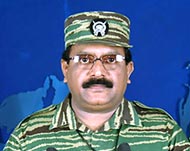Sri Lanka ‘can learn from Irish peace’
Sri Lanka can learn from the Northern Irish peace process as it tries to avoid a return to civil war, a former senior member of the Irish Republican Army (IRA) has said.

Martin McGuinness, now a negotiator in the Sinn Fein political party, was asked by a local pro-peace group to visit Sri Lanka after a string of attacks by suspected Tamil Tiger rebel on government troops raised fears that a 2002 truce might fail.
“Just travelling around the streets here, what do I see on every street I go? I see policemen, soldiers, checkpoints. It just reminds me of what life was like in the north of Ireland over 10 years ago”, he told Reuters in an interview in Colombo, Sri Lanka‘s capital.
“Now, thankfully, we’ve moved away from all that. It was over a period of time people came to the assessment there had to be a political solution to the conflict.”
In July, the IRA – responsible for half the 3600 deaths caused by bombs and shootings during the “troubles” as it fought for a united Ireland and an end to British rule – said it was downing its arms after 1990s ceasefires and a 1998 peace accord.
“The IRA have said … that it’s over now to the politicians — it’s their responsibility to sort it out,” said McGuinness, who says he was once a senior member of the IRA but is now solely with their political ally, Sinn Fein.
“They’ve effectively left the stage and it’s our duty and our responsibility to now tie up the pieces.”
Military stalemate
 |
|
LTTE supremo Prabhakaran only |
A power-sharing provincial government in which Sinn Fein and Unionist parties that want to remain part of Britain would sit together has been on ice since 2002, hampered by deep distrust between the two sides, but while some communal violence has continued paramilitary attacks have largely ceased.
The Liberation Tigers of Tamil Eelam (LTTE) – whose two-decade-long fight for a separate homeland for the Island’s Tamils has seen over 64,000 dead on both sides – also say they want peace and deny recent attacks, but few believe them and analysts say the rebels have used the ceasefire to rearm and prepare again for war.
But McGuinness said just as both the IRA and the British Army had eventually realised they could not defeat each other militarily, the LTTE’s fight for a homeland could not be won in battle.
“My assessment is that the Sri Lankan Army will never defeat the Tamil Tigers and the Tamil Tigers will never defeat the Sri Lankan Army,” he said. “So what’s the next step? It has to be a negotiated settlement. It’s very stark.”
Vemue for talks
|
“Any hang-up that people may have about the venue for talks … should be quickly dispelled” |
Face-to-face meetings between Tony Blair, the British prime minister and Gerry Adams, the Sinn Fein leader, had been key to the 1998 Good Friday agreement, he said, and direct contact between Mahinda Rajapakse, the Sri Lankan president and Velupillai Prabhakaran, the LTTE leader, might also help.
But with the shadowy guerrilla leader only rarely appearing in public and leaving the task of carrying out overseas negotiations to others, few see a meeting as likely. So far, the two sides cannot agree a venue for talks.
“Any hang-up that people may have about the venue for talks … should be quickly dispelled,” he said, saying early Sinn Fein visits to Downing Street had been like going into the lion’s den. “These things have to be done and people have to take risks for peace if there is to be any risk of success.”